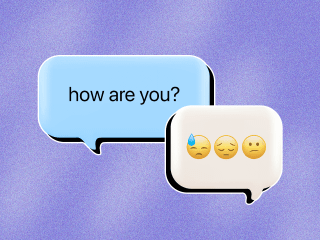7 Therapist-Approved Tips for Anyone Who Sucks at Relaxing
If doing nothing is really hard for you, here's why and what to do about it.
Confession time: I’m a workaholic. Though I can’t pinpoint the exact moment I became one, I know it started with my dad. He served in the Marine Corps and stressed the importance of hard work my whole life. On top of that, the age-old, “You have to work twice as hard to get half as far,” was drilled into my head (if you’re in the BIPOC community, you get it) since I was a kid. So when it came time to enter the “real world” as a millennial amid the economic chaos of the Great Recession, my anxiety levels were off the charts. Knowing how to relax was not even on my radar.
As a result of that origin story, I’ve been on a relentless pursuit of working harder, producing more, and proving myself through my professional accomplishments as a licensed clinical psychologist.
Despite helping others find balance, I often find myself struggling when it comes to taking a break, unwinding, and letting negative emotions like anger, anxiety, and fear take the backseat. And when I do pause, any moment of rest is overtaken by thoughts of my to-do list or just some casual existential dread. I mean, meetings! Emails! Phone calls! Friends! Family! Financial pressure of living in an ever-uncertain potentially crumbling economy! Seriously, it feels like there is never enough time to truly stop, catch my breath, and chill.
I know I’m not alone. Thanks to a glorified hustle culture that encourages us to always stay grinding and “getting to the bag” with “no days off,” many of us have rebranded rest in our brain as unproductive, a waste of time, or worse, a sign of laziness. And when we buy into that philosophy, feelings of anxiety and guilt creep up. Those factors are probably part of the reason you’re reading this right now.
But even if you totally believe that rest is important and the whole “I’ll sleep when I’m dead” thing is ridiculous, external pressures from your job, family responsibilities, and friendship obligations exist. And those heavy expectations can minimize your needs, forcing you to meet the demands of everyone else.
Repeat after me: Chilling isn’t selfish.
It’s an essential investment in your overall well-being and can curb some of the negative consequences of overdoing it on your physical and mental health. That can include your risk of mental health issues, like anxiety, depression, burnout, sleep issues, and chronic stress, according to a meta-analysis of the effects of working long hours and overtime. Obviously, those issues can impact how well you function on the daily. TL;DR, skimping on relaxation not only jeopardizes your health but can also impede your ability to perform at your best, whether that’s your 9-to-5 or caretaking for a loved one.
And, listen, I say all of this as someone who really struggles to just do nothing. So I get it. But because I’m also someone who basically teaches people how to relax for a living, I’ve also got the best ways to find some chill—even when it feels impossible.
Before we dive into all that, you should know there isn't really a wrong way to unwind. We all have our own unique preferences and ways of finding balance (reality TV marathon? Sure! Baking a weirdly complex brownie? OK!). That said, if we rely on certain behaviors or activities that aren’t so great for us in the long run (see: wine nights, TikTok dissociating) it can lead to excessive or addictive behaviors that can actually be harmful to your physical and mental well-being. I like to think about having a relaxation toolbox with a variety of ways you can relax. The key is to listen to your body and mind and choose activities that truly recharge and rejuvenate you.
Ready? We got this.
1. Answer this: How full is your cup?
One obstacle to fully embracing the relaxation life is how you view it. If you think of rest as something that’s negotiable, you might have trouble prioritizing it. But reframing it as something that replenishes your energy levels, reduces stress, and enhances your general quality of life (which it does!), you’ll be more likely to pencil in some nothing.
Sure, sounds easier said than done, but try imagining yourself as a literal cup that holds energy, creativity, emotional capacity, and presence of mind to tackle daily tasks for yourself and others. How full are you? If you sense you are overflowing with more than enough to give yourself and others, that's wonderful. But if you need a refill, ask yourself, "What relaxing activity can top me off?" If you’re struggling to figure out what actually fills your cup, this worksheet, which I recommend to my clients, is a great way to pinpoint activities you might want to prioritize going forward.
For a workaholic like me, refilling my cup can mean getting a good night’s sleep, eating a meal I made myself, or getting in some quality time with friends and family.
When you reframe relaxation in this way, it becomes an intentional act of mental fitness and a way to protect yourself rather than a supposed waste of time. Ultimately, this mindset can empower you to make time for self-care without guilt or hesitation.
2. Hack this common study technique.
If you don't have the luxury of a week-long vacation or spa retreat, you can still get some relaxation in your schedule by trying the Pomodoro technique. This timing method is a productivity and focus tool, but it can also come in clutch when you want to incorporate brief moments of relaxation throughout your day.
Here's how to do it: Decide how long you want your chunks of work to be and how long you want your breaks to be. The traditional Pomodoro technique suggests 25 minutes of focus followed by a five-minute break and some longer breaks as you continue to work throughout the day, but you can honestly just do whatever works for you. Personally, I like to do 50 minutes of focused work with a 10-minute break.
Once you settle on times that you like, choose a simple yet enjoyable activity to do during your designated break. It could be as simple as stepping outside for some fresh air, taking a walk with your dog, listening to some good music, practicing a short meditation, or learning a TikTok dance.
Now, set a timer, start working, actually pause to do your fun stuff when it's time, and repeat this cycle until you've finished your task.
When you use the Pomodoro technique, you'll strike a balance between productivity and self-care. Not only will it help you stay focused and efficient, but it will also give you regular intervals for relaxation that keep you from mindless doom scrolling, spiraling, or just bopping around as time passes by. Plus, it can help with any guilt that you might feel for taking a break because once that timer goes off, it’s back to the grind.
3. Refocus your mind.
Whether you choose to meditate in the morning to set a positive tone for the day or in the evening to unwind and find peace before bed, this mindfulness practice is a solid way to feel more restored.
If you want to try a morning meditation, find a quiet and comfortable space where you can sit or lie down for a few minutes. Then, close your eyes and bring your attention to slowing your breathing, allowing that to guide you into a state of relaxation. You can also use this time to set intentions, visualize positive outcomes for the day, practice gratitude, or silently say some affirmations.
In the evening, meditation can help you release any accumulated stress by putting the events and challenges of the day into perspective and letting them go. Like morning meditation, all you really need to do is find a quiet space, close your eyes, and focus on your breath for a little bit. If you want, you can also think about what positive things happened throughout the day that you’re grateful for.
If the idea of sitting in silence sounds overwhelming, guided meditations, which have gentle instructions and soothing sounds that keep you focused, can be a great alternative. There are tons of guided meditations that you can find on YouTube or apps like Calm and Headspace or even music streaming platforms.
4. Think about your five senses.
Have you ever had the experience of driving home, pulling into the driveway, then thinking, How did I get here? This is a perfect (and common) example of not being mindful and letting your body go on autopilot while your mind drifts elsewhere. This happens to me when I am really stressed or anxious about something and find myself lost in my racing thoughts. But if we’re not careful, not being mindful means it can feel like life is passing us by and we’re too in our head or spaced out to notice it. This is where a mindfulness exercise like the five senses tip can come in handy since it’s all about getting out of your head and getting back into your body and the present moment.
So think about what you smell, hear, see, feel, and taste. You may realize you hear things you didn't notice before, like the humming of your refrigerator, cars driving past, or the birds chirping outside. And maybe you feel the softness of the carpet under your feet, the hardness of the chair you are sitting on, or the roughness of the plastic phone case you are holding. You can try this anytime and anywhere, and it might bring you a sense of relaxation by helping you become more self-aware and less impulsive or consumed by distractions.
5. Do nothing for two minutes.
When life gets hectic and you feel overwhelmed, taking two minutes to do absolutely nothing can be a great way to center yourself. I know that two minutes sounds like barely any time, but just try it and see how relaxing a quick break can actually be before you come for me.
This website has a two-minute timer and calming ocean wave sounds, which feels like a mini vacation (sorta) for a brief moment. During these two minutes, try to let go of any thoughts or worries and just focus on the gentle rhythm of the waves and let yourself unwind. Embracing the stillness can help clear your mind, reduce stress, and restore a sense of inner calm. If you need another dose of beach vibes later, you can always revisit the site.
6. Log out of everything.
If you’re constantly attacked by your weekly screen time report, you’re likely due for some tech-free time, which is a great way to relax in this very online world. When you schedule a digital and social media break, you can cut back on the constant news and information as well as phone-induced envy and FOMO.
Start small and gradually increase your time away from your devices as you get more comfortable. For example, I try not to start my day by checking my phone. Instead, I give myself some time to wake up, center myself, and prepare for the day before I check social media, emails, the news, etc. Try it one day this week and see how it feels when you wake up and wait 15 minutes before you check your phone. If it feels good to you, try increasing the time or the number of days you do this each week.
If this feels awkward, find ways to engage in activities that don't involve screens more often. This can be reading, stretching, or doing your morning or night routines without distractions. When you do, you create space for genuine connections and moments of peace.
7. Schedule some deep breathing reminders.
In grad school, one of my supervisors had a timer that regularly went off in the middle of meetings. It was a reminder to breathe, she explained, and every time it went off, she paused and took a deep breath no matter what she was doing to help her stay mindful and as relaxed as you can be as an educator. That’s because when you take a deep breath, it actually reduces activity in the sympathetic nervous system (associated with your fight or flight response) and jump starts your parasympathetic nervous system (the calming one). Basically, when you take a deep breath, it sends a message from your body to your brain to chill out. Then, your brain sends a message back to your body that it is safe to slow down and calm down.
All you have to do is inhale deeply, pause for a few seconds, then exhale. As you exhale, check in with your body. Release any tension that you notice (it could be in your shoulders, face, or neck) and allow your body to sink a little and loosen up.
This simple yet effective strategy is a great way to build relaxation into your day. And if you're really busy you can set a timer or alarm on your phone like my grad school supervisor and remind yourself to breathe every now and then. You can also use breathing timer apps like Breathe+ and Breathing Zone that let you customize your reminders.
Wondermind does not provide medical advice, diagnosis, or treatment. Any information published on this website or by this brand is not intended as a replacement for medical advice. Always consult a qualified health or mental health professional with any questions or concerns about your mental health.




